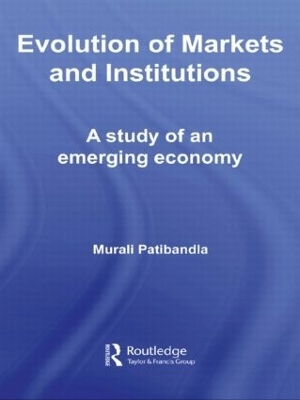
Evolution of Markets and Institutions
A Study of an Emerging Economy
Seiten
2006
Routledge (Verlag)
978-0-415-33967-4 (ISBN)
Routledge (Verlag)
978-0-415-33967-4 (ISBN)
Here Murali Patibandla applies some of the principles of the new institutional economics to a study of India - one of the world's most promising emerging economies.
The new institutional economics has been one of the most influential schools of thought to emerge in the past quarter century. Taking its roots in the transaction cost theory of the firm as an economic organization rather than purely a production function, it has been developed further by scholars such as Oliver Williamson, Douglas North and their followers, leading to the rich and growing field of the new institutional economics.
This branch of economics stresses the importance of institutions in the functioning of free markets, which include elaborately defined and effectively enforced property rights in the presence of transaction costs, large corporate organizations with agency and hierarchical controls, formal contracts, bankruptcy laws, and regulatory institutions. In this timely volume, Murali Patibandla applies some of the precepts of the new institutional economics to India - one of the world's most promising economies.
The new institutional economics has been one of the most influential schools of thought to emerge in the past quarter century. Taking its roots in the transaction cost theory of the firm as an economic organization rather than purely a production function, it has been developed further by scholars such as Oliver Williamson, Douglas North and their followers, leading to the rich and growing field of the new institutional economics.
This branch of economics stresses the importance of institutions in the functioning of free markets, which include elaborately defined and effectively enforced property rights in the presence of transaction costs, large corporate organizations with agency and hierarchical controls, formal contracts, bankruptcy laws, and regulatory institutions. In this timely volume, Murali Patibandla applies some of the precepts of the new institutional economics to India - one of the world's most promising economies.
Copenhagen Business School, Denmark
1. Introduction 2. The Conceptual Framework 3. Initial Conditions and Policy Reforms 4. Direction of Structural Changes 5. Competitive Dynamics 6. Technological Change 7. Organizational Change 8. Evolution of Public and Private Order Institutions. Conclusion. References.
| Erscheint lt. Verlag | 20.4.2006 |
|---|---|
| Reihe/Serie | Routledge Studies in Development Economics |
| Zusatzinfo | 20 Tables, black and white; 5 Line drawings, black and white; 5 Illustrations, black and white |
| Verlagsort | London |
| Sprache | englisch |
| Maße | 156 x 234 mm |
| Gewicht | 830 g |
| Themenwelt | Wirtschaft ► Betriebswirtschaft / Management ► Finanzierung |
| Betriebswirtschaft / Management ► Spezielle Betriebswirtschaftslehre ► Bankbetriebslehre | |
| ISBN-10 | 0-415-33967-7 / 0415339677 |
| ISBN-13 | 978-0-415-33967-4 / 9780415339674 |
| Zustand | Neuware |
| Haben Sie eine Frage zum Produkt? |
Mehr entdecken
aus dem Bereich
aus dem Bereich
denken und handeln wie ein professioneller Trader
Buch | Softcover (2023)
Vahlen, Franz (Verlag)
36,90 €


